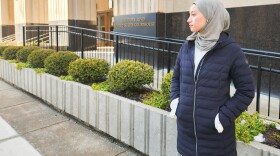
Elinor Epperson
Stateside Production AssistantElinor Epperson interned at Stateside as a production assistant and in the newsroom covering the environment for the Great Lakes News Collaborative and as a general assignment reporter. She finds almost any story interesting, but likes to focus on the environment, energy, health, and LGBTQ issues. She graduated from Michigan State University with a master’s degree in journalism in August 2024. Her thesis was published at Michigan Public as a multi-part series about the Gelman Plume. Elinor skates with Ann Arbor Roller Derby in her spare time.
-
Eight pro-Palestine protesters the University of Michigan fired are suing to get their jobs back. The university says they broke campus rules banning violence, while the protesters argue the move is retaliation for their calls for U of M to cut ties with Israel.
-
The history of a 1929 statewide poll that determined Michigan’s state bird, and why not everyone is happy with the results.
-
Stateside’s April Baer chatted with the musician behind the Dittrich Furs jingle.
-
Stateside’s April Baer chatted with a state forester about new species proposed for the Michigan invasive species list, and what you can do to foster native plants in your garden.
-
A federal judge is set to decide whether to dismiss a lawsuit that eight University of Michigan students and alumni have brought against the school. They say the university violated their free speech rights by firing them several months after protests in 2023 and 2024.
-
Residents attended a protest in Detroit and a virtual public hearing to demand more scrutiny towards DTE's proposal to power a 1.4 gigawatt data center coming to Saline Township.
-
Michelin-starred chef Kieron Hales has cooked for presidents and royalty across 27 countries. As executive chef at Zingerman's Cornman Farms he's found his most fulfilling work: creating custom wedding menus that help couples build lasting memories.
-
You think you know the history? It goes back way before Woody Hayes and Bo Schembechler. We’re tracing the roots of the Ohio State vs. Michigan rivalry.
-
Gildas' Lake Street Bakery in Boyne City offers a variety of savory and sweet fresh-baked goods, including traditional French crepes made to order. Just don’t ask Gildas to add American cheese.
-
Since the height of the COVID pandemic, Michigan has seen a decline in its bottle returns. Some argue the almost 50-year-old system should be updated.










